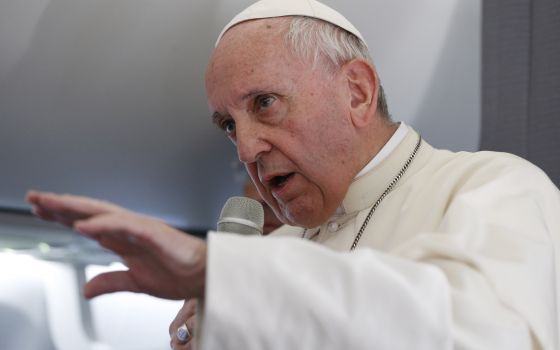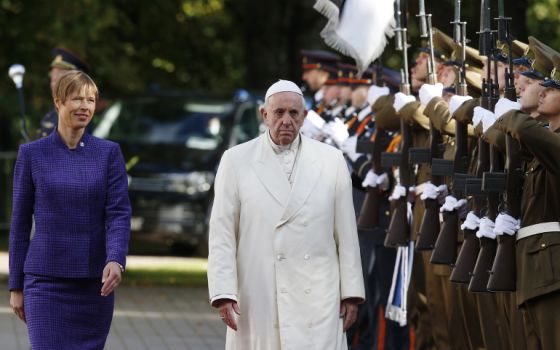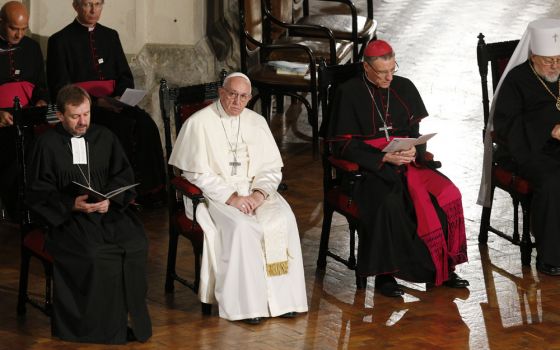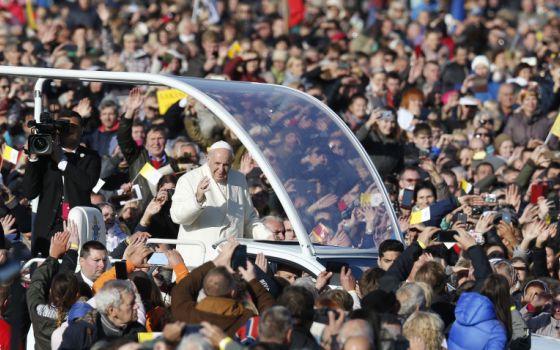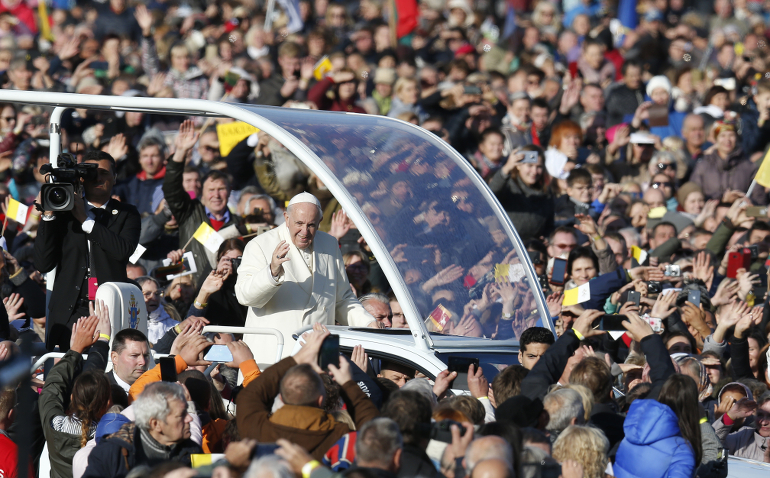
Pope Francis greets the crowd before celebrating Mass at Santakos Park in Kaunas, Lithuania, Sept. 23. (CNS photo/Paul Haring)
Editor's note: This story was updated Sept. 23 at 10:45 a.m. CDT to add details about the pope's visits to the ghetto in Vilnius and to the Museum of Occupations and Freedom Fights.
Pope Francis warned Sept. 23 that society must guard against "any whiff" of a new rise in anti-Semitism, saying that young people who did not experience the barbaric killings of the Holocaust can be lost to its "siren song."
Marking the 75th anniversary of the 1943 Nazi murders of tens of thousands of Jews in Lithuania's capital, the pontiff said humanity must seek to "detect in time any new seeds of that pernicious attitude" that can "taint the heart of generations that did not experience those times."
Francis was speaking in an address before the recitation of the mid-day Angelus prayer with about 100,000 people in this central Lithuanian city on the National Day of Remembrance of the Genocide of the Jews, which marks the Sept. 23, 1943 liquidation of the ghetto in Vilnius, the nation's capital.
The pope visited a memorial to the ghetto later in the day, and also went to Lithuania's Museum of Occupations and Freedom Fights, which has an exposition on the Holocaust.
Before the Second World War, Lithuania was one of the largest areas of Jewish settlement in Europe, with an estimated 210,000 Jews in the country. About 15,000 remained at the end of the war.
Francis referenced anti-Semitism as part of a reflection on the day's reading from the Book of Wisdom, which speaks of a persecution of the righteous by the wicked or ungodly.
"The ungodly claim to believe that 'power is the norm of justice,'" said the pontiff. "They dominate the weak, use their power to impose a way of thinking, an ideology, a prevailing mindset."
"Seventy-five years ago, this nation witnessed the final destruction of the Vilnius Ghetto; this was the climax of the killing of thousands of Jews that had started two years earlier," the pope continued.
"Let us think back on those times, and ask the Lord to give us the gift of discernment to detect in time any new seeds of that pernicious attitude, any whiff of it," he said.
Francis is visiting Lithuania, Latvia, and Estonia Sept. 22-25. He is only the second pope to visit the three countries, following John Paul II, who visited in 1993.
Each of the countries, located as a bloc on the Baltic Sea immediately northeast of Poland and west of Russia, was occupied by Germany in World War II, was later a part of the Soviet Union and is now a member of the European Union.
Earlier in the day Sept. 23, Francis celebrated Mass in Kaunas' Santakos Park and spoke about how Jesus warned against those who seek prestige.
"The thirst for power and glory is the sign of those who fail to heal the memories of the past and, perhaps for that very reason, to take an active part in the tasks of the present," said the pontiff.
Referencing the reading from Mark's Gospel, in which Jesus places a child before his disciples, the pope asked: "Whom would Jesus place in our midst today, here, on this Sunday morning?"
"Perhaps it is the ethnic minorities of our city," Francis suggested. "Maybe it is the elderly and the lonely, or those young people who find no meaning in life because they have lost their roots."
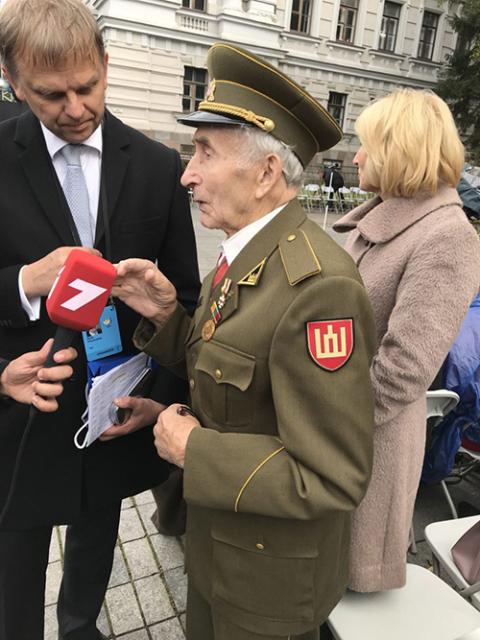
Juozas Jakavonis (Vatican accredited media pool photo)
Crowds in Lithuania, which has a Catholic community numbering about 77 percent of its 2.8 million population, have been enthusiastic for Francis' visit. People began arriving at the open-air park in Kaunas for the pope's Mass at about 5 am, wearing heavy coats and hats for the brisk, fall weather.
Francis visited the Museum of Occupations and Freedom Fights later in the day to commemorate the suffering of Lithuanians throughout five decades of Soviet rule.
The museum, housed in a former KGB headquarters, has a number of moving exhibits, including small cells where prisoners were kept in isolation and a room where they were killed, which is now filled with objects found in mass graves around Vilnius.
Signing the museum's guestbook, the pope said he had prayed silently during his visit that God would "bestow his gifts of reconciliation and peace" upon Lithuanians.
During a public prayer with a crowd of thousands outside, Francis asked that God would "encourage us not to succumb to the fashions of the day, to simplistic slogans, or to efforts to diminish or take away from any person the dignity you have given them."
Among those present in the crowd for the prayer was at least one survivor of the former KGB building: Juozas Jakavonis, who was imprisoned there for three months, is now 93, and dressed for the ceremony in a Lithuanian military uniform.
The pope is to continue his visit to the Baltics by traveling to Latvia Sept. 24. He will return to Lithuania that evening before heading to Estonia Sept. 25, and then back to Rome later that day.
[Joshua J. McElwee is NCR Vatican correspondent. His email address is jmcelwee@ncronline.org. Follow him on Twitter: @joshjmac.]
Advertisement




